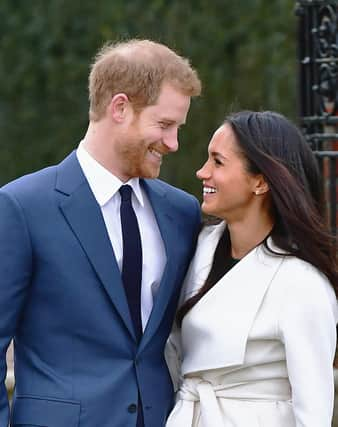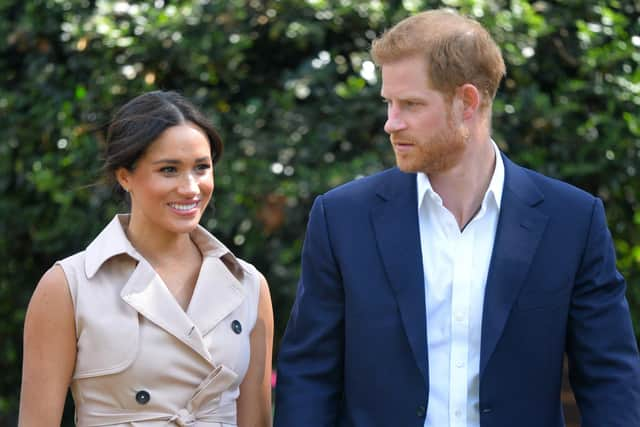Prince Harry's complaints about 'bigoted' media cannot simply be dismissed by hyper-defensive journalists – Laura Waddell


In recent years, publishing has done a lot of navel gazing about demographics, internally in terms of commissioning and inherent biases, and which customers resonate with books published.
It would be fair to say there’s a general baseline consensus that race and class haven’t been considered enough up until very recently, and we have a lot more to do to unpick the problems behind poor statistics. Former Children’s Laureate Malorie Blackman didn’t read a book featuring a black protagonist until she was 21.
Advertisement
Hide AdAdvertisement
Hide AdMost industry conferences now have at least one panel event discussing diversity, but progress is in fits and starts. After a lot of talk, the subject has become partially retrospective, slowly understanding what works and what doesn’t to make cultural change. There is growing frustration with panels in stuffy conference halls which are all talk and no action. (I have been on many of these panels myself, invited to talk about class and publishing.)
Dedicated schemes and support networks are making the most difference. For example, the Spare Room Project provides accommodation for interns who might find living in London out of their budget, by pairing them with people who can offer a place to stay for a week or two.
Necessary self-reflection
Lit in Colour, a Penguin Random House initiative, works with the Runnymede Trust to improve diversity in reading lists in schools, through which children expand their horizons. Charismatic editors championing their own diverse lists are making waves.


As an industry all about communication, reaching people through words, and, since the advent of cheap paperbacks sold in train stations, trying to get those words into as many hands as possible, it feels important that we have nuanced discussions, and even more so, that they continue to evolve into real, enfranchised change. Like journalism, publishing is business, with a history of social responsibility. But it is eye-opening when some high-profile figures from the world of journalism, an industry I only dip my toe into, resist starting these conversations at all.
In a new documentary on racism, the BBC presenter Naga Munchetty describes feeling she was being "difficult” for talking about racism. By contrast, publishing is at the stage of realising talk isn’t enough.
Nikesh Shukla, editor of the hugely popular book The Good Immigrant, which sparked a trend in themed anthologies of diverse writers, has warned that inclusivity must not be deployed solely as a marketing hook. Ahead of his appearance at the Edinburgh International Book Festival in 2017, speaking to the List magazine, he said: “My skin colour is not a fluctuating lucrative or unlucrative marketing trend; it's my f***ing life.”
How publishing and journalism confront the subject feels very different. Against the backdrop of a sea of online abuse, a culture of hyper-defensiveness may dissuade necessary self-reflection.
Regressive, bad-tempered display
Hesitancy can be seen in a tweet from Jess Brammar, editor-in-chief of Huffington Post, formerly at Newsnight: “I considered not saying anything about this because I’m aware I won’t make myself popular with my peers but I’m just going to stand up and say it: I don’t agree with statement from my industry body that it is ‘untrue that sections of UK press were bigoted’.”
Advertisement
Hide AdAdvertisement
Hide AdThere are undoubtedly changemakers in journalism, but the hot-headed, resistant, brittle backlash whenever the subject of race and journalism comes up, or the idea it’s controversial at all to point it out, is really quite shocking when peering in from a different words-based industry.
Following Oprah Winfrey’s royal interview, in which Prince Harry criticised the British press as "bigoted”, the Society of Editors released the statement referred to by Brammar which claimed: “The UK media is not bigoted and will not be swayed from its vital role holding the rich and powerful to account following the attack on the press by the Duke and Duchess of Sussex.”
But do they hold themselves to account? This was followed by the society’s executive director, Ian Murray, squaring up to Victoria Derbyshire on BBC News. In a viral clip, an angry Murray interrupts Derbyshire repeatedly as she points to headlines supporting the Sussex’s point.
However, after reports some board members were deeply unhappy with the statement, a clarification was issued admitting “there is a lot of work to be done in the media to improve diversity and inclusion”.
Meghan and Harry not alone
Meghan and Harry’s views of the British tabloids are not theirs alone. In 2015, Zeid Ra’ad Al Hussein, the UN High Commissioner for Human Rights, called for the UK to curb incitement to hatred in the British tabloids.
He said, “under the guise of freedom of expression, they are being allowed to feed a vicious cycle of vilification, intolerance and politicisation of migrants…” and in 2016 the European Commission against Racism and Intolerance reported, “hate speech in some traditional media, particularly tabloid newspapers, continues to be a problem”.
I’m aware of the cuts that hover over heads and newsrooms shrunk in half but doing no less work than before. I cannot imagine going through all of that, while also looking at news boards staffed largely by financially comfortable white men, and not combusting with frustration.
A 2020 Reuters factsheet examining the “top ten news outlets” reported “in Germany and the UK, home to millions of people of colour, none of the outlets in our sample have a non-white top editor”.
Advertisement
Hide AdAdvertisement
Hide AdIs this where backlash against acknowledging racism germinates? Perhaps editors who can look around a boardroom and see multiples of themselves feel the existential need to quash dissent before it grows. Often the status quo is replicated by those who aspire to be in such rooms. Why else do kneejerk refusals to even acknowledge the problem sound so deeply personal? We can pore over screeds of inflammatory tabloid headlines. But we can also look directly at the top brass of British news to prove that journalism’s reckoning with diversity has barely even begun.
A message from the Editor:
Thank you for reading this article. We're more reliant on your support than ever as the shift in consumer habits brought about by coronavirus impacts our advertisers.
If you haven't already, please consider supporting our trusted, fact-checked journalism by taking out a digital subscription.
Comments
Want to join the conversation? Please or to comment on this article.